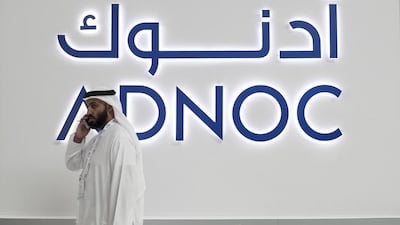The Abu Dhabi National Oil Company is studying a number of fund raising options at both group and asset level that will help unlock value and optimise the group's balance sheet as it pushes ahead with its new approach to drive growth.
Adnoc is in discussions with banks for a club loan of approximately US$5 billion that will be used for ongoing corporate activities. It is also looking into financing options for select midstream infrastructure assets including potentially tapping debt capital markets via a bond issuance. Plans are at an early stage so the size and scope of any potential bond issuance has not been decided. The company said it has no intention to issue bonds at the holding or main operating company levels such as Adco, Adma-Opco and Zadco.
“Considering its very low gearing ratios, Adnoc is taking a more active approach to managing its capital structure to unlock value, raise long term capital, enhance returns and drive growth,” a company spokesman said. “Adnoc is therefore considering various options with regard to the potential use and issuance of debt.”
The potential new external financing – which would be Adnoc's first apart from a Dh12bn loan from Japanese banks agreed in 2016 - is part of the transformation strategy implemented by chief executive Sultan Al Jaber, who took on the role last year with a mandate to make Adnoc more efficient and much more performance-driven, similar to a modern international energy company.
In just over a year, its offshore operations are going through a consolidation, the integration of its shipping and marine services has begun, procurement has been centralised at group level, the operation of some of its non-core operations has been outsourced to the UAE private sector and a new management performance system has been introduced. The company’s headcount and structure has also been streamlined.
Adnoc is now opening up for new partnerships and co-investments, for the first time across all areas of the group – not just in oil & gas concessions and petrochemicals but also in drilling, pipelines, storage and refining – and potential partners include international pension funds, private equity investors and global infrastructure specialists.
Since it articulated its new approach last month, Adnoc said it has "noticed a considerable amount of inbound enquiries and in particular around our energy infrastructure venture we announced".
Anita Yadav, head of fixed income research at Emirates NBD, said that investors are unlikely to get materially concerned with Adnoc injecting some debt into its capital structure.
“In the long run, debt is a cheaper form of funding than the equity and therefore some amount of debt makes the capital structure more efficient for a corporate,” she said. “The level of optimum gearing can be anywhere from 0 per cent to 100 per cent (debt/equity) or higher, without investors getting concerned or worried about leverage, depending on which industry the company operates in.”
Given the Emirate of Abu Dhabi’s high-grade credit rating – Fitch puts Abu Dhabi’s long-term foreign and local currency issuer default ratings at AA – and Adnoc’s central contribution to its fiscal strength, any debt issued by the company should attract “fine pricing” and significant interest, said Ms Yadav.
Krisjanis Krustins, an associate director in Fitch’s sovereign team confirmed that the agency typically sees “any debt of a state-owned entity as a contingent liability of the government, irrespective of whether any explicit guarantees are provided”. This is likely to mean that Adnoc – which is not subject to any individual corporate rating – will benefit from favourable borrowing terms in accordance with Abu Dhabi’s strong credit profile.


